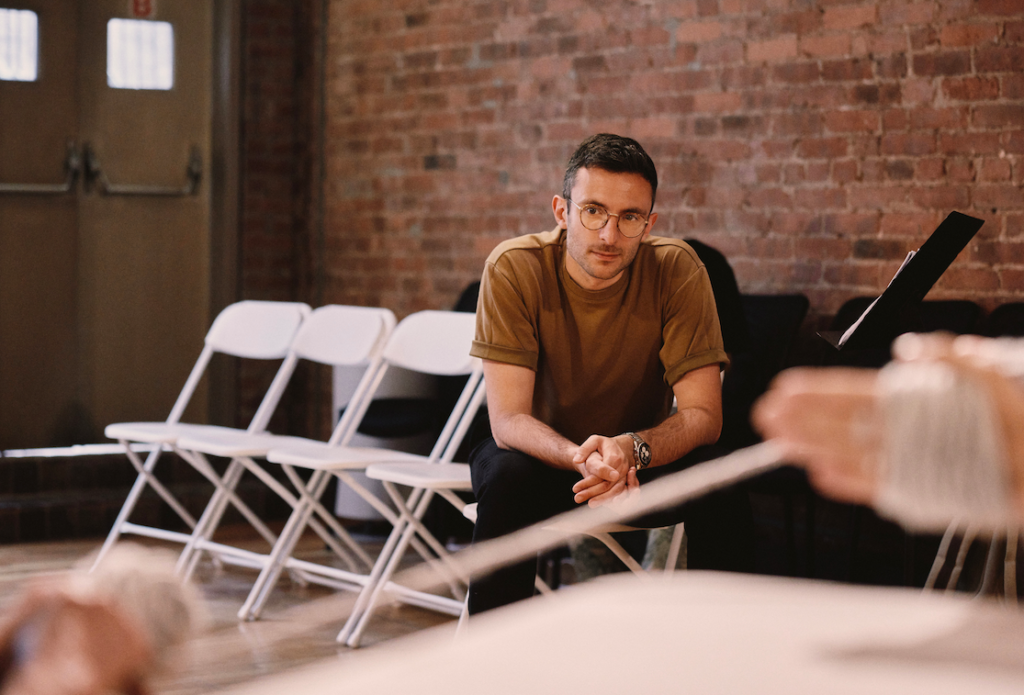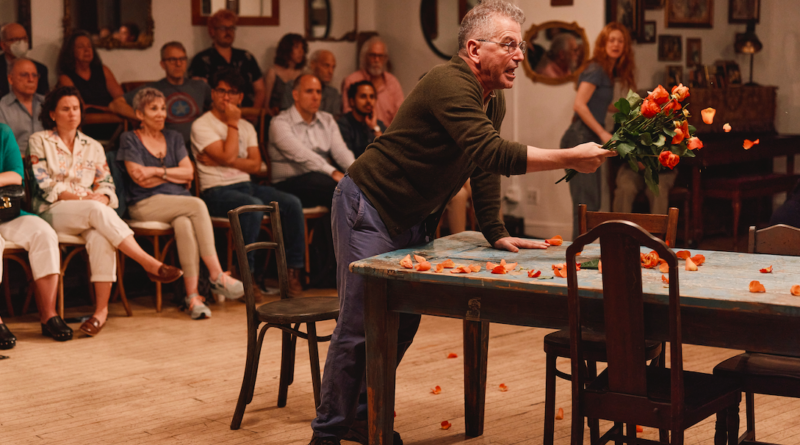INTERVIEW: With ‘Uncle Vanya,’ Jack Serio finds himself at the helm of summer’s hottest ticket
Photo: Uncle Vanya, directed by Jack Serio, stars David Cromer as the title character. Photo courtesy of Emilio Madrid / Provided by Everyman Agency with permission.
Summertime can be a sleepy time for New York theater, although this year has proved the exception. There have been several Broadway openings, and the off- and off-off-Broadway scenes have stayed vital and busy. The hottest ticket in town is the new production of Anton Chekhov’s Uncle Vanya, courtesy of OHenry Productions. The intimate revival is staged in a loft apartment, not a traditional theater, and features a wondrous cast that includes David Cromer, Marin Ireland, Will Brill and other theatrical luminaries.
At the helm of the production, which finishes its return engagement Sunday, Sept. 3, is director Jack Serio, who has cornered the market on intimate theater. Last year he directed a World War II love story called This Beautiful Future, and earlier this year he staged David Greenspan in a séance play called On Set With Theda Bara. Now he’s back with Uncle Vanya and keeping things intimate. Earlier in the summer, Uncle Vanya played to 40 people per night; this new engagement finds the play being performed for 85 — still quite intimate.
Recently Hollywood Soapbox exchanged emails with Serio about the heralded summer run of Chekhov’s classic. Questions and answers have been slightly edited for style.
What are the particular challenges of staging Uncle Vanya in such an intimate setting?
There are many! Translating the space from 40 audience members to 85 has been a challenge, but our entire, incredible creative team was excited to meet it head-on. It was important to preserve the sense of intimacy from the first production, and navigating that in a slightly larger space was tricky at first. We’re now seating the audience on all four sides of the action, as opposed to two, as well as working around two structural columns in the room. Making sure everyone has a clear sightline was one of the biggest challenges to conquer. However, now, no matter where you sit in the room, you’ll have a great seat. You may not see every single moment, but you’ll have at least one moment that almost only you will get to see. Every audience member is granted their own, individual vantage point. There also isn’t traditional theater infrastructure like dressing rooms, sound and lighting equipment, etc. so we’ve had to build our own. All of which has contributed to an immediate, handmade feeling for the production.
What are the unique opportunities of staging Uncle Vanya in such an intimate setting?
More than anything, I think the intimate nature of the setting allows an audience to feel like they are hearing the play anew, almost like they are eavesdropping on a private conversation. We’ve tried our very best to remove the veneer of “acting” and to allow the production to feel as organic and as natural as possible. You’ll feel as though you’re a part of the action from the moment you step inside the space. It’s a kind of complete immersion in the world of the play that is only possible in unconventional spaces.
Do you feel this play still speaks to a 2023 audience?
Our audiences cannot stop remarking on how urgent and contemporary Uncle Vanya feels, which is a testament to both Chekhov’s brilliance and the success of Paul Schmidt’s translation. They are convinced we’ve updated the text in some way (we haven’t) and are shocked to hear the translation is over 20 years old. In many ways, it’s obvious political resonance is still easily legible; it was 120 years ahead of its time in terms of discussing the severity of our climate crisis. But more broadly (and I think more importantly), it illustrates that people, even a century ago, were facing the same problems we still are today. The play is timeless; it will always be relevant. We will always be asking big questions about love, beauty and mortality. These are questions that span across generations and make a text as old as this feel urgent and brand new.
What have you learned about the play and its characters as you’ve made this journey?
I don’t think this play has heroes and villains; it just has people. Every character is both right and wrong — all the time. The play doesn’t ever side with any one character or their point of view; it just presents all of them to us. Learning that and trusting in it has been the biggest revelation. It has also allowed us to reject some of the unchallenged, inherited ideas about the text and the characters, and bring new interpretations to them. All these characters contain contradictions inside of them, and the more we underlined those contractions the more I started to see myself in the piece.
What do you like about Paul Schmidt’s translation?
Schmidt’s Chekhov translations are the gold standard in my opinion. They strike the necessary balance of being both incredibly faithful to Chekhov’s original text while being conversational and accessible to a contemporary audience. It was important to me that the translation be modern but that the production not be transposed to a modern setting. Schmidt’s translation was the perfect fit for this kind of approach. Our physical production aims for a kind of period smudginess — both then and now. The social, historical and geographical context of Uncle Vanya (Russia in 1899) is important to the story and cannot be simply dismissed. Astrov must travel 20 miles on horseback. Vanya and Sonya live and work on a rural farm. They have no easy connection to the outside world. We aren’t in the suburbs with an internet connection, and Schmidt’s translations importantly preserve these necessary specifics while still allowing the play to speak to us today.
With David Cromer in a central role, you find yourself directing a director (who, of course, is also an actor). Are there any differences in your approach?
It has felt like such a gift to have David Cromer in the rehearsal room. He’s been a friend for a long time, but to finally work together as colleagues has been an incredibly rich and rewarding experience. I was so nervous to direct David (and the rest of the company!), and it took at least a week before I really had any kind of confidence in the rehearsal room, surrounded by these titans. However, I don’t think directing a director changed my approach. If anything, David’s understanding of his own acting work and the rhythm of scene work was aided by his own work as a director, which only helped me do my job. He was so sensitive not to overstep and only approached this project as an actor and not a director. My job just became to help him hone and craft his Vanya into something we both believed in. I feel very lucky to have earned his trust.
By John Soltes / Publisher / John@HollywoodSoapbox.com
Uncle Vanya, directed by Jack Serio, continues through Sunday, Sept. 3. The play takes place in a loft in New York City. Click here for more information and tickets.


